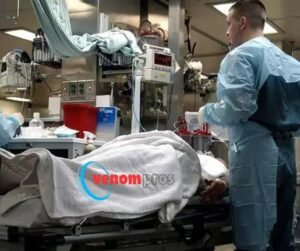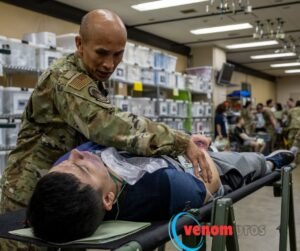
The First Line of Defense
Emergency medicine specialists are among the most vital players in healthcare, often standing as the first line of defense when a crisis hits. From life-threatening injuries to acute medical conditions, they are trained to act swiftly, make critical decisions, and provide life-saving treatment. In the high-stakes world of emergency medicine, seconds can make the difference between life and death, and these professionals are the ones stepping in when every moment counts.
What is an Emergency Medicine Specialist?
An emergency medicine specialist, also known as an ER doctor, is a physician trained to handle urgent medical situations. They assess and treat patients with severe illnesses or injuries that require immediate attention. Their work environment is usually the emergency department (ED) of a hospital, though they also coordinate with first responders in pre-hospital care in the First Line of Defense.

Key Responsibilities and Expertise
Emergency medicine specialists are tasked with stabilizing patients, providing critical care, and determining the appropriate course of action. Whether it’s ordering diagnostic tests, performing lifesaving procedures, or deciding if a patient needs surgery, their expertise spans across various medical fields. They handle everything from trauma, cardiac emergencies, and strokes to less critical cases like minor injuries and infections in the First Line of Defense.
The History of Emergency Medicine
Emergency medicine is a relatively new specialty in the medical world, formally established in the 1960s and 1970s. Before its emergence, emergency care was often handled by general practitioners or rotating hospital staff, which led to inconsistent and sometimes inadequate care. The Vietnam War played a crucial role in shaping emergency medical services as military doctors and medics gained valuable experience treating severe trauma under battlefield conditions. This experience, coupled with the need for structured, rapid-response care back home, led to the development of emergency medicine as a dedicated field.

Specialized Training of Emergency Medicine Specialists
After completing medical school, doctors must go through a residency program specializing in emergency medicine, which typically lasts 3-4 years. During this time, they develop the skills needed to treat a wide range of conditions. Many also pursue certifications in areas like advanced cardiac life support (ACLS) and trauma life support (ATLS) to ensure they can respond to various emergencies in the First Line of Defense.
Key Skills for Emergency Medicine Specialists
Emergency medicine specialists are required to think on their feet. Critical thinking, problem-solving, and quick decision-making are paramount. They often face incomplete or unclear patient histories, so their ability to act quickly, yet methodically, is critical. Adaptability and emotional resilience are also essential since they regularly deal with high-stress situations.
The Emergency Room: A High-Stress Environment
It’s a place where medical staff never know what’s coming through the door next. Emergency departments see a variety of cases, from severe trauma due to accidents to sudden cardiac events and strokes.
Common Emergency Cases
Some of the most frequent cases emergency medicine specialists deal with include:
Cardiac Arrest: Immediate intervention with CPR or defibrillation is crucial.
Trauma and Accidents: These may range from car crashes to workplace injuries, requiring swift action to prevent complications.
Poisoning and Overdose: Quick assessment and the right antidote or treatment can save lives.
While they may be based in the hospital, emergency medicine specialists work closely with paramedics and EMTs (Emergency Medical Technicians) who provide pre-hospital care. They coordinate the triage process, which determines the severity of the patient’s condition and what treatment is required in the First Line of Defense.
Innovations in Emergency Medicine
Technological advancements have transformed the way emergency medicine specialists work. From portable ultrasound machines to telemedicine tools, these innovations have improved diagnostics and speed up treatment. Telemedicine has especially proven useful in connecting rural areas with larger medical facilities, allowing specialists to guide treatments remotely.

Challenges Faced by Emergency Medicine Specialists
While rewarding, the life of an emergency medicine specialist is also fraught with challenges. Burnout is common due to the high pressure and emotional toll of the job. Specialists often work long hours, and the unpredictability of emergency medicine means they must always be ready for the unexpected in the First Line of Defense.
Coping Mechanisms for High Stress
To manage stress, emergency medicine specialists often rely on strong teamwork and peer support. Many hospitals also provide counseling services and wellness programs to help staff cope with the emotional demands of their jobs in the First Line of Defense.
Working with Multidisciplinary Teams
Collaboration is essential in emergency medicine. Specialists often work alongside surgeons, cardiologists, and other healthcare professionals to provide comprehensive care for patients.

The Impact of COVID-19 on Emergency Medicine
Emergency medicine specialists were on the frontlines, treating critically ill patients and dealing with overwhelming caseloads. The experience also highlighted the importance of adaptability and preparation in handling large-scale medical crises in the First Line of Defense.
The Future of Emergency Medicine
The future of emergency medicine looks promising, with emerging technologies such as AI and robotics offering new ways to diagnose and treat patients. AI-driven tools can help with faster diagnostics, while robotics may assist in surgeries and other complex procedures, making emergency rooms even more efficientin the First Line of Defense.
Conclusion
Emergency medicine specialists are the unsung heroes of the medical world, stepping in during the most critical moments to save lives. Their dedication, expertise, and ability to remain calm under pressure are nothing short of extraordinary. As the field continues to evolve, these professionals will remain essential to healthcare, adapting to new challenges and technologies in the First Line of Defense.
Also read this;>“Deadly Drops: The Chemistry and Biology of Animal Venoms”
Also read this;>Babar Azam’s Home-Away Variance and Recent Form A Growing Concern for Pakistan






